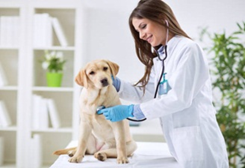5В120100-Veterinary Medicine
Model of the graduate of the Bachelor’s
of the educational program «Veterinary medicine»
 Veterinary medicine is an independent branch of science dealing with the prevention of various diseases, their diagnosis and treatment, as well as various injuries and disorders in animals. This branch includes not only theoretical knowledge, but also active practical activity. In addition, veterinary medicine solves veterinary and sanitary problems of environmental protection. Veterinary medicine is an independent branch of science dealing with the prevention of various diseases, their diagnosis and treatment, as well as various injuries and disorders in animals. This branch includes not only theoretical knowledge, but also active practical activity. In addition, veterinary medicine solves veterinary and sanitary problems of environmental protection. |
| The purpose of the educational program |
|
training of highly qualified, competitive, innovative-oriented specialists in the field of veterinary medicine, for the formation of fundamental, practical knowledge, skills necessary for solving scientific and practical problems |
| Awarded degree |
| veterinary specialist, specialty 6B09101 Veterinary medicine; |
| List of specialist positions |
| administrator in the veterinary clinic, veterinary consultant, veterinarian, teacher of secondary schools. |
| Objects of professional activity |
|
agricultural formation; veterinary laboratory; veterinary public enterprises; research institutions; customs; markets and trading companies involved in sales of animals and products of animal origin; meat; educational institutions |
| Functions of professional activity |
|
diagnostics, prevention and treatment of non-contagious and contagious diseases of animals, birds and fish bred in farms of various directions and forms, prevention of diseases of non-contagious etiology, development and circulation of medicines for animals, environmental protection; promotion of the implementation of research results in production; teaching in educational institutions. |
| Personal characteristics |
|
1. Common civil qualities: patriotism, expressed in love for the Motherland, citizenship, determined by an active lifestyle, civil self-consciousness, law-abiding, understanding of their civil rights, freedoms and duties. 2. Spiritual and moral qualities: humanity, honesty, conscientiousness, tolerance to other beliefs, world views and customs, decency, mercy. 3. Intellectual qualities: erudition, critical and emotional thinking, fluency in English, information and communication technologies, the ability to learn throughout life. 4. Business qualities: hard work, responsibility, flexibility, adaptability, ability to work in a team, ability to take non-standard decisions in emergency situations. 5. Organizational and volitional qualities: determination, self-demanding, , self-criticism, state of being organized, communicability, the existence of a shared culture, will, the ability to achieve the intended purpose. 6. Special qualities: love animals endlessly |
| Bachelor's learning outcomes - Veterinary medicine (Dublin descriptors) |
|
At the end of the educational program graduates are able to: 1) demonstrate knowledge and understanding in the field of study, based on advanced knowledge of the area; 2) apply knowledge and understanding at the professional level, formulate arguments and solve problems of the studied area; 3) collect and interpret information to form judgments taking into account social, ethical and scientific considerations; 4) communicate information, ideas, problems and solutions, to both specialist and non-specialist audiences; 5) learning skills necessary for independent continuation of further education in the field of study. |

